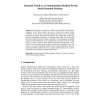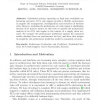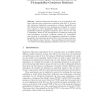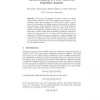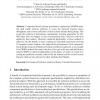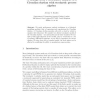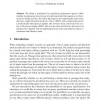119
click to vote
ESWS
2008
Springer
15 years 4 months ago
2008
Springer
In this paper, we introduce a formal email workflow model based on traditional email, which enables the user to define and execute ad-hoc workflows in an intuitive way. This model ...
126
Voted
EPEW
2008
Springer
15 years 4 months ago
2008
Springer
The accessible specification of performance queries is a key challenge in performance analysis. To this end, we seek to combine the intuitive aspects of natural language query spec...
110
click to vote
EPEW
2008
Springer
15 years 4 months ago
2008
Springer
Embedded systems operating on high data workloads are becoming pervasive. ECA rule engines provide a flexible environment to support the management, reconfiguration and execution o...
109
click to vote
EPEW
2008
Springer
15 years 4 months ago
2008
Springer
Markovian behavioral equivalences can be exploited for state space reduction before performance evaluation takes place. It is known that Markovian bisimilarity corresponds to ordin...
135
click to vote
EPEW
2008
Springer
15 years 4 months ago
2008
Springer
Abstract. We present an application of partial evaluation to performance models expressed in the PEPA stochastic process algebra [1]. We partially evaluate the state-space of a PEP...
131
click to vote
EPEW
2008
Springer
15 years 4 months ago
2008
Springer
Abstract. Component-based software performance engineering (CBSPE) methods shall enable software architects to assess the expected response times, throughputs, and resource utiliza...
112
click to vote
EPEW
2008
Springer
15 years 4 months ago
2008
Springer
The problem of finding trust paths and estimating the trust one can place in a partner arises in various application areas, including virtual organisations, authentication systems ...
102
click to vote
EPEW
2008
Springer
15 years 4 months ago
2008
Springer
We apply performance analysis techniques to a biological modelling problem, that of capturing and reproducing the Circadian rhythm. A Circadian rhythm provides cells with a clock b...
133
click to vote
EPEW
2008
Springer
15 years 4 months ago
2008
Springer
Currently compilers contain a large number of optimisations which are based on a set of heuristics that are not guaranteed to be effective to improve the performance metrics. In th...
131
Voted
EPEW
2008
Springer
15 years 4 months ago
2008
Springer
We define a mechanism for specifying performance queries which combine instantaneous observations of model states and finite sequences of observations of model activities. We reali...
